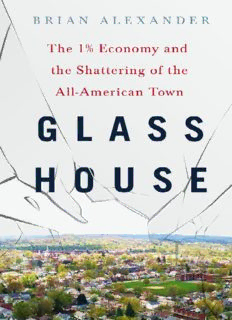
Glass House: The 1% Economy and the Shattering of the All-American Town PDF
Preview Glass House: The 1% Economy and the Shattering of the All-American Town
Begin Reading Table of Contents About the Author Copyright Page Thank you for buying this St. Martin’s Press ebook. To receive special offers, bonus content, and info on new releases and other great reads, sign up for our newsletters. Or visit us online at us.macmillan.com/newslettersignup For email updates on the author, click here. The author and publisher have provided this e-book to you for your personal use only. You may not make this e-book publicly available in any way. Copyright infringement is against the law. If you believe the copy of this e-book you are reading infringes on the author’s copyright, please notify the publisher at: us.macmillanusa.com/piracy. To the memories of: Thomas Alexander immigrant, master tool and die maker Cleveland, Ohio Edward “E. B.” Stern office boy/sales manager, McKee Glass/Thatcher Glass Jeannette, Pennsylvania Robert Alexander salesman/vice president, Lancaster Glass, independent manufacturers’ representative Lancaster, Ohio Agnes “Bobby” Alexander Fairfield Heritage Association, Fairfield County Hospital Twig 3, Miller for Congress co-chairwoman, League of Women Voters, poll worker Lancaster, Ohio “The nation-state at best is based on the social contract that is also an emotional contract, stamped by the charisma of the past.” —SVETLANA BOYM, The Future of Nostalgia PREFACE The Cop Eric Brown’s chin trembled. He stopped talking, because if he kept going he was going to cry, and, by God, he wasn’t going to cry. But then he did—a little—and then I found myself tearing up, too. So there we were, two middle-aged men, a cop and a reporter, sitting in a booth inside the Cherry Street Pub, clearing our throats, dabbing the backs of our fingers to our eyes, hoping nobody would notice. By now I was used to people fighting the urge to cry. At first I was surprised: The Lancaster, Ohio, I remembered was not a teary sort of place. But in the months before Brown and I sat down together, I’d frequently had to pause to let people gather themselves. A gnarly old union man was the first, when he told me a story about a toolbox his mentor in Anchor Hocking Plant 1 presented to him on the day the senior glassmaker retired. The older man had fashioned the toolbox out of steel, used it for over thirty years, and was now passing it on. Most others choked up when they struggled to properly explain how much they loved their town. Getting the explanation right was important to them because they felt obliged to defend that love to an outsider—which was what I was now—in the face of so many seemingly obvious reasons to leave. I didn’t expect it from Brown, though. Maybe because he was a cop. He said, “I felt I carried the weight of this community on my shoulders.” Ostensibly, he was referring to his efforts to rid the community of heroin—which, he was quick to point out, plagued not only Lancaster but every small city from the east side of the Appalachians through Indiana, though Lancaster had somehow gotten the reputation of being heroin heaven, a reputation Brown tended to blame on the reporters who popped down U.S. 33—“Heroin Highway,” as many called it— from Columbus on slow news days to do ninety-second stand-ups in front of police headquarters. Brown had run the Fairfield-Hocking Major Crimes Unit. About 90 percent of “major crimes” in the two counties were somehow connected to drugs. And so, he continued, “when you look around our community, all the bad things that are happening seem to be centered around drugs. Man, that’s a lotta weight to carry.” For years Brown carried that weight like a Trojan. Well-known by his fellow task force officers and administrators around the state of Ohio, he had earned a reputation for being smart and sophisticated. His peers selected him to go to Washington, D.C., to plead for funding. Yet he sensed he’d become cynical. Cynicism wasn’t a natural fit for Brown. Born and raised in Lancaster, he made a name for himself as a star football player at Lancaster High, and he was still a solid guy with a palimpsest of golden-boy looks under the tempering that decades of policing had laid down. After trying big-time college ball, Brown returned to become a local policeman because he wanted to help protect his town. Coming from anybody else, that would sound corny. But for Brown, who could swear if he needed to, “Gosh!” and “My goodness!” were the natural defaults. Eventually, he married a Hajost, and so into a prominent local family. (As a teenager, I’d suffered through an unrequited crush on another Hajost girl.) But it was these very hometown bonds that nurtured his cynicism. He’d come to the conclusion that he and his fellow cops could arrest drug users and dealers all day, every day, without making much of a dent in the problems that nagged Lancaster. He wasn’t unique in this. After forty years of drug warring, police all over the country were chanting “We can’t arrest ourselves out of this.” Unlike
Description: